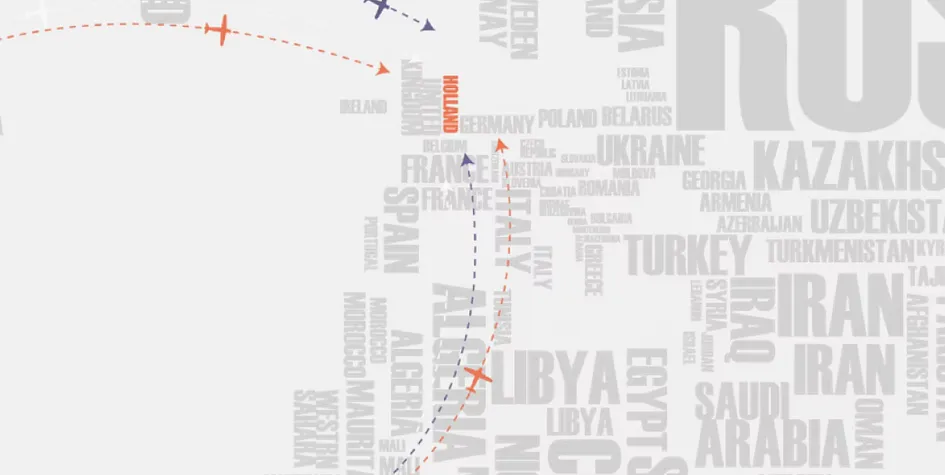Always up to date to find your dream job!
We only need a few personal details, thanks!
Whether you’ve just found a new job in the Netherlands with Undutchables, or you’re planning to move for educational purposes, to join a family member who is Dutch, or you’re coming to the country for any other reason, you may have some questions about your move.
For example, what do you need to establish residence? Can you bring your household goods to the country duty-free? Is it possible to import a car? In this blog, we’ll discuss everything that you need to know about moving to the Netherlands. Read on, and get all the details you need.
Establishing Residency In The Netherlands – Visas & Basic Information
Naturally, you’ll need to ensure you have legal residency in the Netherlands before you make your move. Anyone living or working in the Netherlands for more than 90 days will need such a permit.
If you are an EU, EEA (European Economic Area), or Swiss citizen, you will not require any kind of residence permit to live and work in the Netherlands – though you will need to register at the local Dutch “gemeente” (municipality) within 4 months of your move. This also applies to family members of EU/EEA and Swiss nationals living in the Netherlands.
However, if you are not an EU, EEA or Swiss citizen, you will need a residence permit. To get a residence permit, you will need to be sponsored by a Dutch person or organization. This may be an employer if you are coming to the Netherlands to work, a family member if you are coming for family reasons, or an educational institution if you are studying in the Netherlands.
In some cases, you may also need to apply for an MVV – a temporary type of residence permit – at a Dutch embassy or consulate in your country of residence before your move. This permit allows you to come to the Netherlands as a potential resident, rather than a tourist. However, it is not an official residence permit. It is not necessary for those who are coming to the Netherlands from Japan, South Korea, Australia, New Zealand, Canada, the USA, the UK, Monaco or Vatican City.
The process and steps you will need to take to apply and gain approval for your residence permit vary greatly depending on your personal circumstances. For a full overview of the process, you should take a look at the IND (Immigration and Naturalisation Service) website.
Taxes And Duties For Importing Household Goods
Household goods can be imported to the Netherlands duty-free as long as you have lived outside of the Netherlands for at least 12 months, and have owned the items for at least 12 months.
In addition, your household goods must not be sold or lent for at least 12 months after importation. If your previous residence was within the EU, these limitations drop to 6 months.
There are also some items that may be dutiable or restricted while importing to the Netherlands. This includes some electrical appliances, computers, antiques & precious works of art, precious metal objects (jewelry), and medicine (with prescription, otherwise prohibited). In addition, no firearms, ammunition, and weapons can be imported without specific license & registration documents issued by the police.
Items that are completely disallowed for importation include pornographic/subversive material, narcotics, and illegal drugs, CB radios, meat products, all species of cactuses and orchids, and any products made from threatened/endangered exotic animals.
Documents For Importing Household Goods
The following documents will be required when you import your household goods:
Passport copy, including Police Entry stamp and photo page
For more information, we recommend consulting with the NID and your employer, educational institution or other sponsor. This will ensure that you have all the required documentation to streamline this process.
Taxes And Duties For Importing Vehicles
Importing a vehicle into the Netherlands is actually quite simple. As long as your vehicle has been owned and used for a minimum of six months, and it was listed on the original Import Permit request form, it can be imported duty-free. In addition, it cannot be sold for at least 1 year after importing it into the Netherlands. You will need to be present at the Customs Office to sign papers of exemption for your vehicle, and you must have the keys readily available.
Documents For Importing Vehicles
To import your vehicle to the Netherlands, you will need the following documents:
Our Tips For Moving To The Netherlands – What You Need To Know
That covers all of the basics about getting your residence permit and importing your household goods to the Netherlands – so now, let’s go over a few simple tips you can keep in mind during (and after) the process of making your move.
Prepare For Your Move To The Netherlands With This Guide!
Whether you’re moving to the Netherlands from elsewhere in the EU, or from further abroad like America or Australia, this guide is sure to help you prepare for your move.
So take another look at the above information now, do a bit of your own research, and start getting ready for your own Dutch adventure! You’re sure to love your new lifestyle in the Netherlands.
Article written by Joe Webster from www.a1autotransport.com
Would you like to receive our Undutchables Newsletter? In this newsletter we will give you guidance on working in the Netherlands and working with internationals, let you know about upcoming events and share interesting articles. And do you wish to stay up to date about our latest vacancies? Subscribe now to our job alert and you will receive the newest vacancies straight into your inbox.

We only need a few personal details, thanks!
